Potter Surname Ancestry ResultsOur indexes 1000-1999 include entries for the spelling 'potter'. In the period you have requested, we have the following 2147 records (displaying 11 to 20): Single Surname Subscription | | | Buying all 2,147 results of this search individually would cost £12,490.00. But you can have free access to all 2,147 records for a year, to view, to save and print, for £100. Save £12,390.00. More... |
These sample scans are from the original record. You will get scans of the full pages or articles where the surname you searched for has been found. Your web browser may prevent the sample windows from opening; in this case please change your browser settings to allow pop-up windows from this site. Inhabitants of Leicester
(1103-1327)
The Corporation of Leicester commissioned the publication (in 1899) of extracts from the earliest borough archives, edited by Mary Bateson. This volume brings together several important sources: the borough charters; the merchant gild rolls (from 1196 onwards); tax returns; court rolls (from about 1260 onwards); mayoral accounts, &c. All the Latin and French texts are accompanied by English translations. Membership of the merchant gild was by right of inheritance (s. p. = sede patris, in his father's seat), or by payment of a fee called a 'bull' (taurus). The sample scan shows part of a gild entrance roll; those marked * paid their bull, and were thus, by implication, not natives, or at least not belonging to gild merchant families. By 1400 membership of the gild merchant had become the equivalent of gaining freedom of the borough (being a free burgess): but at this period the two were not necessarily the same, and some of the merchant gild members were not resident in the borough, merely traded there. Not all the tax rolls surviving for this period are printed: but full lists of names are given for a loan for redemption of pontage and gavelpence of 1252-3 (pp. 44-46); five tallages of 1269 to 1271 brought together in a single table (128-145); and tallages of 1286 (208-211), 1307 (255-257), 1311 (272-274) and 1318 (310-313). The portmanmoot (or portmote) was the borough court dealing with minor infractions and civil suits. Finally, there is a calendar of charters (from c.1232 onwards, 381-400), and a list of mayors, bailiffs (reeves), receivers and serjeants (401-407).
POTTER. Cost: £4.00.  | Sample scan, click to enlarge

| Inhabitants of Warwickshire
(1332)
This lay subsidy roll for Warwickshire records the tax of a tenth and a fifteenth on the laity of the county at Michaelmas 1332. The record is arranged by boroughs, ancient demesnes, and hundreds, and within hundreds by township. The roll was translated and edited by William Fowler Carter and published by the Dugdale Society in 1926, with an appendix printing the lay subsidy rolls for Stratford-upon-Avon of 1309, 1313 and 1332, and a brief extract from an assize roll of 1323 inquiring about irregularities in the levying of the tax.POTTER. Cost: £4.00.  | Sample scan, click to enlarge
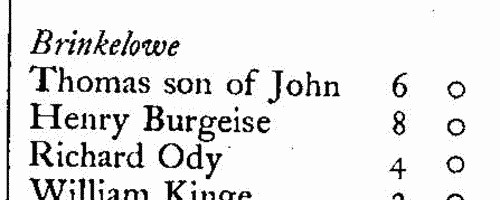
| Lancashire landowners and their tenants
(1310-1333)
This compilation of abstracts of Lancashire inquisitions, extents (surveys) and feudal aids (taxes) was prepared for the Lancashire and Cheshire Record Society and printed in 1907, from originals in the national archives of the Public Record Office. Almost all the material has been translated from the original abbreviated Latin: where surnames have been Anglicized, the original is shown in italics, as with the word 'faber' in the sample scan. POTTER. Cost: £6.00.  | Sample scan, click to enlarge
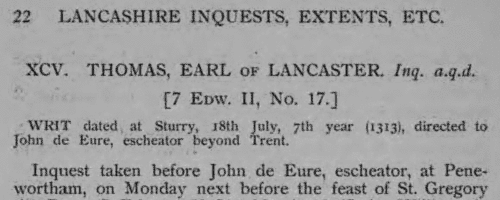
| Freemen and citizens of London
(1314-1337)
Letter Book D, or the Liber Rubeus (Red Book) of the City of London contains enrolments of recognizances between inhabitants, particularly citizens, for sums of money lent or due; grants of pieces of land or property; and various records relating to the city administration, minor infractions, &c. In addition, this volume includes the record of admissions to the freedom of the city by redemption (payment of a sum of money), and the binding and discharge of apprenticeships for the same period. Without freedom of the city - which could only be gained by birth (patrimony), apprenticeship or servitude, or by redemption - no man could open a shop, sell goods retail, or even reside within the city walls (except for a limited time, and then only in the houses of freemen and under frankpledge). The text was edited by Reginald R. Sharpe and printed by order of the Corporation of the City of London in 1902.
POTTER. Cost: £4.00.  | Sample scan, click to enlarge

| Close Rolls
(1333-1337)
The close rolls of the 7th to 10th years of the reign of king Edward III, that is from 25 January 1333 to 24 January 1337, record the main artery of government administration in England, the orders sent out day by day to individual officers, especially sheriffs of shires: they are an exceptionally rich source for so early a period. In amongst this official material, the rolls were also used as a way of recording many acknowledgments of private debts and contracts between individuals. Most of the contents relate to England, but there are also entries concerning Wales, Scotland, Ireland and the English possessions in France: particularly Scotland, where the king was campaigning during this period. This calendar was prepared by A. B. Hinds of the Public Record Office and published in 1898.POTTER. Cost: £4.00.  | Sample scan, click to enlarge

| Tenants of the Bishopric of Durham
(1345)
Bishop Hatfield's Survey, a record of the possessions of the see of Durham, made by order of Thomas de Hatfield, bishop of Durham 1345 to 1381, was edited by the Rev. William Greenwell for the Surtees Society and printed in 1856. As appendixes, he also transcribed a bailiff's roll of the manor of Auckland from the 5th year of bishop Richard de Bury, Hatfield's immediate predecessor; several bailiffs' rolls of the 5th year of Hatfield's pontificate; and a general receiver's roll of bishop John de Fordham, Hatfield's immediate successor.POTTER. Cost: £4.00.  | Sample scan, click to enlarge
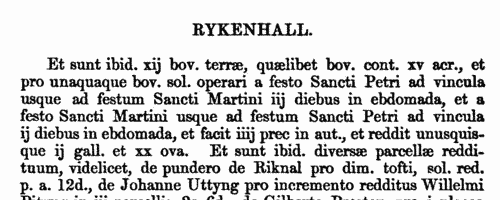
| Testators and legatees in London
(1258-1358)
The mediaeval Court of Husting of the city of London sat (usually on a Monday) each week: among its functions was the enrolment of deeds and wills relating to citizens of London. In their strictest technical sense the terms 'will' and 'devise' are appropriate to real estate, and the terms 'testament', 'bequest' and 'legacy' to personal estate, but this distinction is lost sight of in ordinary usage. This calendar of wills proved and enrolled in the Court of Husting was edited by Reginald R. Sharpe, records clerk in the office of the Town Clerk of the City of London, and printed by order of the corporation in 1889. The date of the court is given in italics, with the year in bold in the margin. The testator's name is given in capitals (surname first, in bold), and then a brief listing of substantial bequests, with the names of legatees, and then the date of making of the will, and reference. Sometimes there were further proceedings in the court relating to the will, such as 'It was found by a jury that the testator was of full age when he made the above testament', a statement as to where the testament had been proved, or proceedings on a challenge to the testament &c. - such additional material is added in a smaller typeface in this edition.POTTER. Cost: £4.00.  | Sample scan, click to enlarge

| Inhabitants of Cheshire and North Wales
(1350-1359)
The county of Cheshire had palatine status, being in some measure independent of the rest of England: moreover, from the Statute of Wales of 1284, after king Edward I's subjugation of North Wales, until the union of England and Wales in 1536 to 1543, much of the administration of North Wales (county Flint in particular) was directed from Chester. When the Chester Recognizance Rolls were moved from Chester to the Public Record Office, they were placed among the Welsh Records. These rolls, so called because they do include recognizances (of debts &c.) among their contents, are in fact the Chancery Rolls of the palatinate, containing enrolments of charters, letters patent, commissions and other documents issued under the seal of the palatinate. Deeds and other evidences of a private nature were also enrolled on them. A calendar of the Recognizance Rolls from their commencement to the end of the reign of Henry IV was prepared by Peter Turner and included in the 36th Annual Report of the Deputy Keeper of the Public Records in 1875. We have now indexed this, dividing the enrolments into decades. This is the period from the 23rd to the 33rd years of king Edward III.POTTER. Cost: £6.00.  | Sample scan, click to enlarge
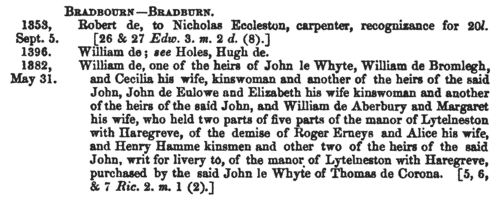
| Clerks and Clergy in Herefordshire, Shropshire and Gloucestershire
(1344-1360)
The register of bishop John de Trillek of Hereford, containing general diocesan business, but also including ordination lists for monks and clergy. Only a small proportion of the clerks went on to acquire benefices and remained celibate. Hereford diocese covered almost all Herefordshire, southern rural Shropshire, a westward arm of Worcestershire, and a northwestern slice of Gloucestershire.POTTER. Cost: £6.00.  | Sample scan, click to enlarge
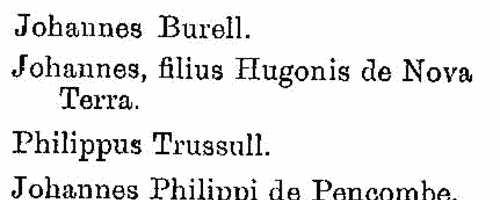
| Inhabitants of Saltmarshe in the East Riding of Yorkshire
(1379)
The poll tax returns of the 2nd year of the reign of king Richard II for Howdenshire, the area around Howden, were transcribed from the original in the Public Record Office (Exchequer Lay Subsidies 202/69) and published in the Yorkshire Archaeological & Topographical Journal in 1886. In editing the text, the abbreviated Latin has been extended, and those occupations that appear have been put in italics. The normal tax for a husbandman or labourer and his wife was 4d, as was that for a single person; but tradesmen paid 6d or more. POTTER. Cost: £6.00.  | Sample scan, click to enlarge

|
Research your ancestry, family history, genealogy and one-name study by direct access to original records and archives indexed by surname.
|












